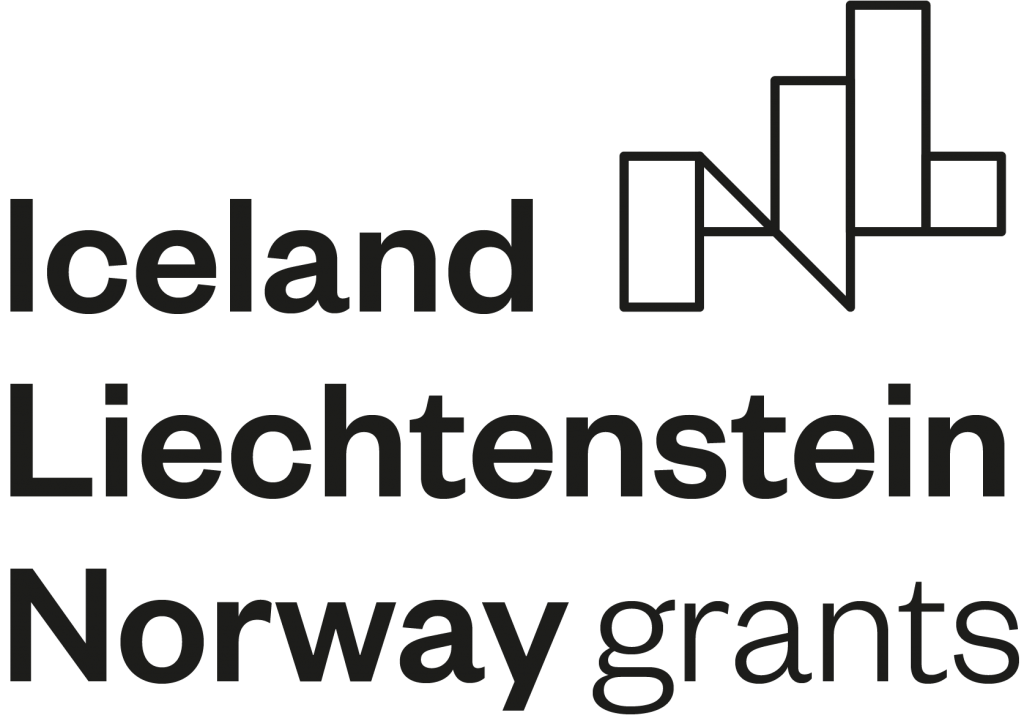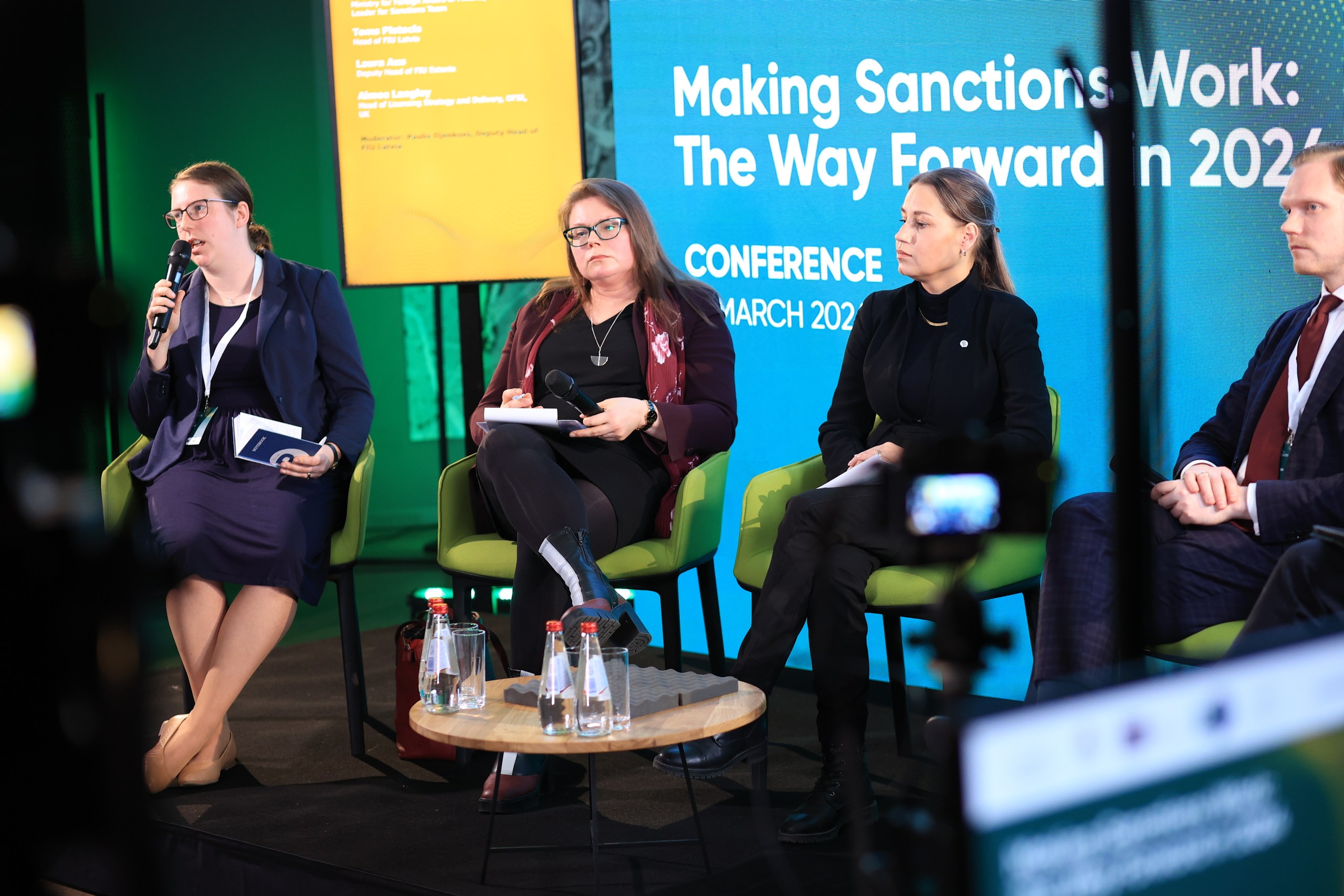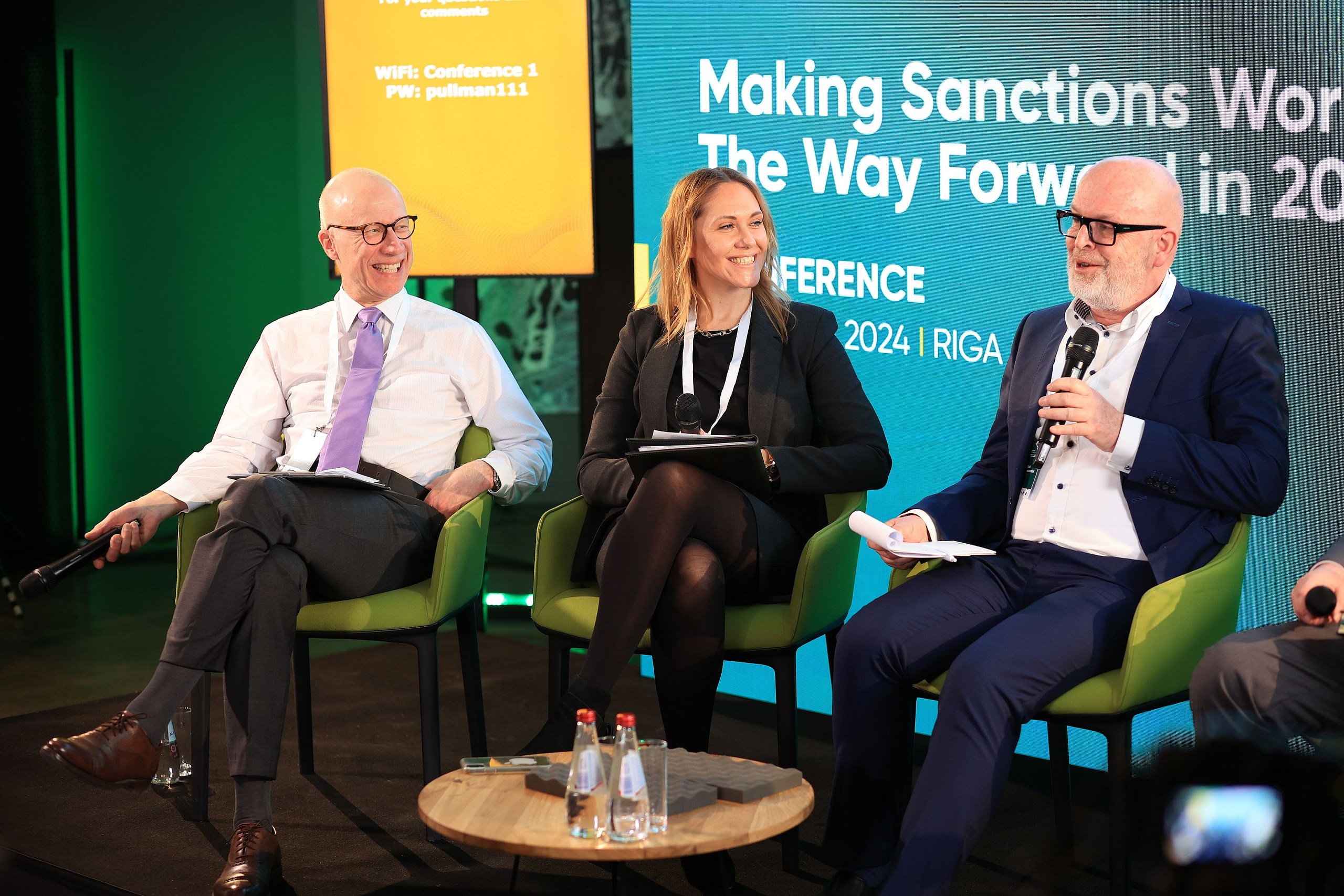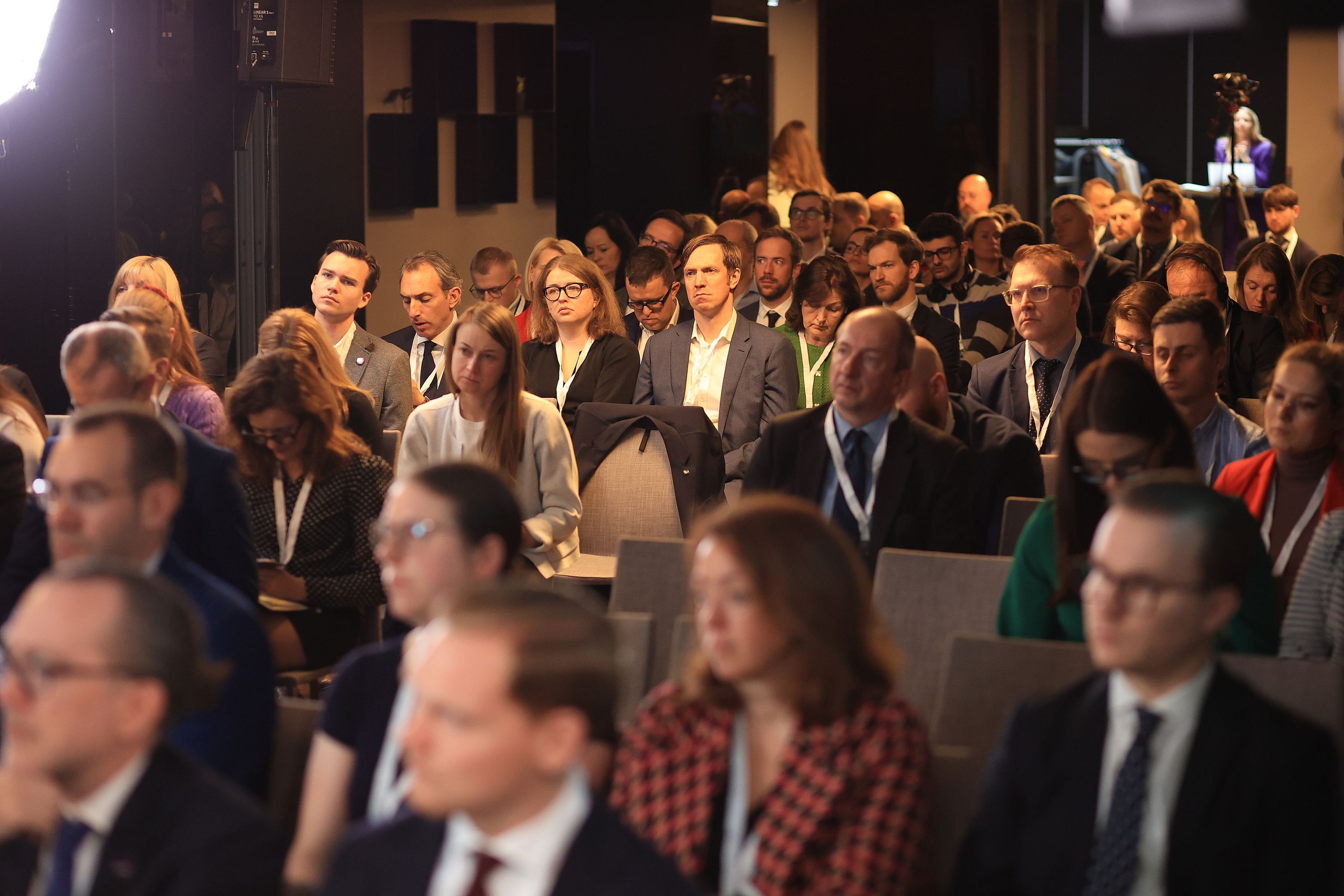
On 19 March 2024, the international conference “Making Sanctions Work: The Way Forward in 2024” was held in Riga, gathering over 100 participants in person and around 900 online. The Financial Intelligence Unit (FIU) of Latvia hosted the conference in cooperation with the Centre for Financial Crime and Security Studies (CFCS) at RUSI and the Latvian Institute for International Affairs, with the support from EEA Grants.
The conference convened 21 international experts from 9 countries: national authorities, financial institutions, and industry to exchange their experiences and discuss opportunities to strengthen the implementation and enforcement of sanctions at the operational level across the EU.
Toms Platacis, Head of FIU Latvia, opened the conference announcing the upcoming changes in Latvia in relation to sanctions. From 1 April 2024, FIU Latvia will become the competent institution in charge of the implementation of sanctions in the country. Mr Platacis highlighted the relevant timing in hosting this conference amidst these changes and the road ahead to address the complex challenges posed by the heightened sanctions risks.
Rihards Kozlovskis, Minister of Interior of Latvia, welcomed the conference with an emphasis on the key role played by sanctions in our security. Mr Kozlovskis asserted that sanctions are not merely a diplomatic tool, they are the cornerstone of Latvia’s national security and their visible impact on Russia’s ability to sustain its military campaign in Ukraine showcase their strategic importance.
The EU Sanctions Envoy David O'Sullivan delivered a keynote speech highlighting the successful effects of sanctions in limiting Russia's profits from the energy industry and depriving its military from the microelectronic components it requires to wage its war of aggression in Ukraine. Mr O'Sullivan emphasised that sanctions are only as important as their implementation and enforcement.
Some of the main highlights from the discussions at the conference are:
- Vladyslav Vlasiuk, Advisor to the Office of the President of Ukraine, joined a conversation with Tom Keatinge, Director of Centre for Financial Crime and Security Studies at RUSI, on the need to strengthen sanctions to make a difference on the battlefield. Mr Vlasiuk encouraged Ukraine’s allies to see what sanctions are accomplishing. Russia struggles to obtain key microelectronic components for its Saheed drones, increasingly failing due to the need to turn to lesser-quality components. However, Mr Vlasiuk insisted on the importance of taking decisive actions and listed three priorities: achieve the confiscation of Russian assets, strengthen the enforcement of the oil price cap, and engage with international financial institutions following the US Executive Order of December 2023.
- In the panel discussion “Making Domestic Implementation Models Succeed”, moderated by Paulis Iļjenkovs, Deputy Head of FIU Latvia, representatives from different national competent authorities (NCAs) discussed their varying powers and responsibilities in their respective sanctions implementation models, their roles in approving derogations and licensing, and the support they provide for the implementation of sanctions by the private sector. The different NCAs gathered included financial intelligence units from Latvia and Estonia, the Ministry of Foreign Affairs of Finland, and a separate body dedicated to sanctions in the UK’s OFSI. The discussion described the positive aspects of centralised competences but agreed that there is no uniquely successful model and efforts should be dedicated to ensuring their effectiveness and promoting outreach with the private sector. The conversation concluded with a discussion on the need of the EU to have a centralised body for the implementation of sanctions, a proposal vocally supported by FIU Latvia.

- Tom Keatinge, CFCS Director at RUSI, and Kinga Redlowska, Head of CFCS at RUSI Europe, discussed the role of research in making sanctions. RUSI has been committed to enhancing the knowledge and awareness of sanctions across Europe and established in early 2022 the European Sanctions and Illicit Finance Monitoring and Analysis Network (SIFMANet). SIFMANet has convened over a dozen roundtables in EU member states, gathering national authorities and the private sector to assess the progress and challenges faced in the implementation and enforcement of sanctions. Both authorities and businesses are committed to their responsibilities, but researchers support the strengthening of their strategic vision and help shine a light on policy and operational deficiencies to achieve more robust sanctions regimes.
- Benjamin Hilgenstock, Senior Economist at the Kyiv School of Economics, joined Gonzalo Saiz, Research Analyst at CFCS at RUSI, in a discussion on the current impacts of sanctions on Russia and opportunities for the improvement of sanctions implementation and enforcement. Mr Hilgenstock highlighted the damaging effects that sanctions are having on Russia’s energy revenue and military-industrial complex, but the pace of impact is too slow. The enforcement of the oil price cap must be strengthened for sanctions to limit Russia’s capabilities to fund the war. Likewise, export controls should be reinforced, particularly through supporting non-financial operators that have scarce sanctions experience. The discussion concluded emphasising that robust sanctions and export control regimes are essential for national security and the priority of ensuring their effectiveness should outlast the focus on Russia to respond to future threats.
- The panel “Making Enforcement Count” gathered authorities from across the EU to discuss the level of enforcement action and its effectiveness. Speakers agreed that finding Russian assets is not a simple task, as they are often concealed behind complex ownership structures and cross-border networks. Many national authorities were not fully prepared to implement the raft of sanctions that ensued in February 2022, but Ruud Leeuwendaal, Head of Team Anti-Terrorism Financing and Sanctions at FIOD in the Netherlands, showcased how many member states have been consistently increasing their efforts, particularly in light of the emerging risks of circumvention as trade is diverted via third countries. Lars Schmidt, Director and Sanctions Coordinator at Sweden’s Ministry for Foreign Affairs, presented their national initiative through which Swedish authorities had distributed a sanctions brochure among exporters to inform them of their obligations, provide support, and show vigilance. The discussion concluded with an expectation of upcoming enforcement actions that will address violations and deter future breaches.

- Pierre-Arnaud Lotton, Sanctions Policy Officer at DG for Financial Stability, Financial Services and Capital Markets Union (FISMA), joined Marta Tilhena, Head of Sanctions Implementation Division at FIU Latvia, in a one-one-one discussion to discuss the European Commission’s efforts to support the implementation and enforcement of sanctions across the EU. Mr Lotton described the increased policy attention to fight circumvention, with new measures such as the extension of the transit ban via Russia or the new no Russia clause, but recognised the importance of ensuring their implementation. While there is still a lack of harmonisation among member states on issues such as ‘control’ over entities, the Commission is committed to continuing its outreach, leverage information-sharing tools, and provide guidance to bridge discrepancies and promote uniform understandings.
- The panel discussion “Making Public-Private Cooperation Stronger” addressed the key role played by the private sector at the forefront of sanctions implementation. Emil Dall, Senior Consultant and Sanctions Lead at FINTRAIL, described how the unprecedented scale of sanctions has changed the international compliance landscape, with the EU and UK sharing the sanctions spotlight traditionally dominated by the US. Laima Letiņa, Advisor at Finance Latvia Association, highlighted the lack of readiness of the banks’ clients to implement sanctions, increasing the administrative burden of financial institutions by demanding greater manual efforts to perform enhanced due diligence on customers and their commercial activities. Gem Conn, Vice President, Content Strategy and Quality, Risk & Compliance at Dow Jones, concluded with a call for authorities to provide as much information as possible in sanctions lists to help ease these increased tasks, avoid false positives, and improve the quality of suspicious transaction reports.
- Michael Khoo, Co-Director of the Task Force KleptoCapture, participated remotely in a conversation with Tom Keatinge and described the efforts of the task force in ensuring that sanctions and export controls regimes are enforced, obtaining evidence of sanctions violations and circumvention, and achieving the prosecution and conviction of wrongdoers. Other international initiatives such as the G7’s Russian Elites, Proxies and Oligarchs (REPO) Task Force have also contributed to advance these efforts. However, Mr Khoo concluded that challenges persist in this regard. Many jurisdictions still have not criminalised sanctions evasion, which hinders mutual legal assistance requests. The upcoming EU Directive criminalising sanctions violations should mitigate this gap but the lag has been considerable.

- Paulis Iļjenkovs, Deputy Head of FIU Latvia, delivered the closing remarks gathering the main conclusions from the discussions, paving the road ahead for future engagements among the key sanctions stakeholders in the EU, and the inspiration that FIU Latvia can provide to other member states to centralise their sanctions competences to facilitate their effective implementation and enforcement.
Full conference recording is available HERE. A recap video of the conference can be viewed HERE. The FIU Latvia is grateful to all the speakers, moderators and participants of the conference and looks forward to upcoming events!
Conference was organized under EEA Financial Mechanism period 2014-2021 programme “International Police Cooperation and Combating Crime” project No. EEZ/FID/2021/6 “Improvement of Employee Knowledge in Combating Money Laundering in Latvia”.





